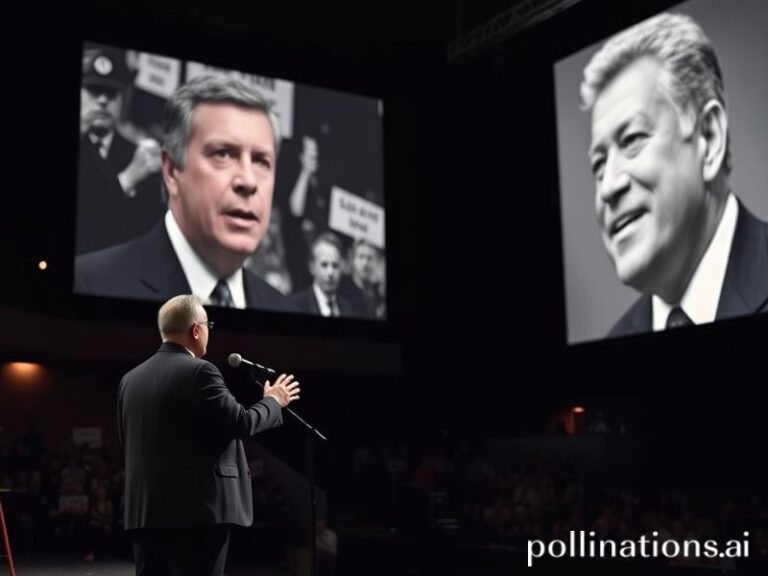Trevor Lawrence, Global Quarterback: How One NFL Star Throws Soft-Power Spirals Across a Burning Planet
The Curious Case of Trevor Lawrence: How a Quarterback from Cartersville, Georgia Briefly Became the UN Secretary-General of American Soft Power
By the time Trevor Lawrence trotted onto the Wembley pitch last October for the Jacksonville Jaguars’ annual hostage-taking of British NFL fans, the global temperature had risen another 0.2°C, two more democracies had quietly expired, and TikTok had birthed a dance craze inspired by grain shortages. Yet for those three hours, 86,000 soggy Londoners suspended their collective dread to watch a 6’6″ golden retriever in shoulder pads remind the planet that—when push comes to shove—America still exports messianic blondes better than anyone since Sweden in the seventies.
International analysts (a job title that now competes with “influencer” for moral bankruptcy) like to point out that Lawrence’s appeal is less about football than about the United States’ ongoing effort to rebrand imperial decline as premium streaming content. Every spiral he throws in Munich or Tottenham becomes a soft-power drone strike: harmless on the surface, devastatingly effective at convincing German teenagers that third-and-long is more pressing than, say, the collapse of the Rhine. The Bundesliga, once the pride of the Ruhr, now loses weekend eyeballs to a man whose signature hairdo looks suspiciously like it was styled by the same committee that designs UN peacekeeping helmets—equal parts heroic and doomed.
Meanwhile, in the smog-choked sports bars of Beijing, pirated Jaguars streams flicker between power outages. Chinese censors allow Lawrence’s face because, unlike most American exports, it appears to have no ideology beyond a sort of Presbyterian good-naturedness. State media has even coined the term “Tǎifó Lólún” (“Buddha of the Shotgun”), a nickname that simultaneously flatters and neuters him. Somewhere in a windowless room, a Party apparatchik is drafting a white paper titled “How to Manufacture 1.4 Billion Quarterbacks Who Will Never Protest Anything.”
Down in Latin America, where the NFL’s marketing budget is roughly equivalent to Guatemala’s annual coffee revenue, Lawrence jerseys have become the ironic T-shirt of choice among university Marxists. Nothing screams “late-stage capitalism” quite like wearing the merchandise of a franchise worth $3.5 billion while arguing that Allende was misunderstood. Brazilian anthropologists have already published peer-reviewed papers on the phenomenon—“Futebol Americano as Cargo Cult: Waiting for Trevor to Throw the Apocalypse”—complete with footnotes citing both Bourdieu and an ESPN TikTok of Lawrence politely refusing to dab.
Back in the imperial core, the irony is thicker than London fog: Jacksonville itself, a city whose main export is foreclosure notices, has suddenly become a pilgrimage site for Japanese tourists seeking authentic “Amerikanu kibun.” They pose outside TIAA Bank Field, a stadium named after a retirement fund that will almost certainly be underwater before they collect it, and purchase $14 hot dogs that taste exactly like the geopolitical anxiety they flew 7,000 miles to experience.
The broader significance? Lawrence is the living embodiment of what political theorists call “hegemonic diffusion by highlight reel.” Every 40-yard frozen rope reinforces the subconscious narrative that the U.S., despite its flaming domestic tableau, still knows how to choreograph hope in 4K. The rest of the world consumes this hope the way medieval peasants swallowed indulgences: aware it’s probably a scam, but unwilling to risk the alternative. When Lawrence inevitably signs his next $275 million contract, the number will be reported in Lagos and Lahore with the same solemnity as a G7 interest rate hike. Somewhere, a Ukrainian drone pilot will glance at the headline between sorties, mutter “Nice for him,” and return to cheaper existential crises.
In the end, Trevor Lawrence is not a quarterback; he is a diplomatic courier delivering the message that American mythology still compiles. The ball he throws may land incomplete, but the signal reaches every corner of a planet that can’t decide whether to laugh, cheer, or file a restraining order. And until the oceans finish their slow-motion invasion of Florida, the rest of us will keep watching—because surrendering three hours of dread for one perfect spiral is, these days, the most honest trade any of us can make.







